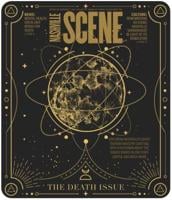Jessica Breanne’s new LP Rosebud Queen, out Friday, begins with its title track, opening on an ambient sampling of nature sounds. She creates a sense of place and opens a window to the world in which she tells her story. The band sets up a loping groove with an unusual harmony that doesn’t tell you quite how it expects you to respond emotionally. A few bars later, her soulful voice, whose uniqueness and boldness bring to mind Joanna Newsom and Karen Dalton, comes in crooning.
Breanne sings, “I love your beautiful face / Tell me, what was your rose / And your thorn today,” foreshadowing the themes of darkness and light she explores throughout the album. The longtime Nashvillian singer-songwriter originally hails from Uncertain, Texas, a small town on the Louisiana border characterized by wilderness and swamps. Breanne carries this environment with her everywhere she goes. It’s a primary influence on the overall Southern Gothic tone of the album, which confronts death, pain and loss through nature metaphors and literary storytelling.
Breanne formerly fronted a blues-rock outfit called The Electric Hearts, and Rosebud Queen is her debut album as a solo artist. Though she’s been making music as long as she can remember, making this record allowed her to start fresh and enter a new stage of life in which she used music to process her emotions. She found herself harnessing vulnerability as a strength in her songwriting for the first time.
“When I first sat down to do this writing, I was starting over again,” Breanne tells the Scene by phone. “It was very scary at first. When you’re in a band, you can rely on other people to help you with some of the hard parts of creation. But I was so excited because, to be honest, I don’t even know how I lasted in that world for that long. [In the past], when I tried to write songs that were truly for my spirit, people would make fun of me. Being too vulnerable wasn’t cool. I used to beat myself up and think, when I started writing these songs, ‘This is ridiculous.’ Then I was like, ‘No, this is who I really am, without other people chiming in.’ ”
While she wasn’t sure what she had to say when she first sat down to write, a series of traumatic events in her life began to take place: the suicide of one of her best friends, the death of her father from lung cancer and witnessing loved ones close to her lose their will to keep going. These experiences broke her spirit. But by using music as a way to process them, she was able to remain open instead of shutting herself off.
“That was a really dark time,” she recalls. “I’d always been scared to talk about a lot of the darkness that has surrounded me. Really these songs are beacons of light that help me get through hard times. They’re all little quilts and palaces I’ve built to protect from dark and damaging things.”
Because she was treading new creative territory, Breanne thought long and hard about who she wanted to involve in the recording of the album. Alongside her creative and life partner John Fox, she enlisted guitarist Sean Thompson and engineer Jake Davis to co-produce and play on the record. Pianist Christina Norwood, drummer Nicholas Swafford and members of the ’70s-schooled pop band Ornament are among the other friends and co-conspirators who sat in on the sessions at Davis’ home studio, dubbed Big Planet Studios, which sits along the Cumberland River.
“It was a really great environment,” Breanne says. “It felt homey, and you got to see the river, and it kind of felt like you were in a different city. It was cool to be removed, especially since these songs feel so vulnerable and Nashville doesn’t always feel like a vulnerable place.”
The trust among everyone involved vibrates like a kind of cosmic chord through the songs. The dance between darkness and light plays out over a cinematic and very Southern soundscape. It’s filled to the brim with layers of searing electric guitar, staccato acoustic fingerpicking, delicate piano and meditative synth that sonically matches the depth of the lyrical material. The result is dramatic compositions with psychedelic flourishes.
The songs are tied together so well that it’s hard to separate one from the whole. Rollicking “Fireflies” and dance-tinged “Belle of the Ball” tap into the feeling of entrapment, whether it’s prompted by literal inspiration like quarantine or something more ephemeral like broken dreams and loneliness. In “Bloom,” reminiscent of swoony Roy Orbison, Breanne repeats like a mantra, “Digging up my dreams just to replant them / In hopes they’ll survive / It’s hard to tear the wings from my dreams sometimes / They say patience comes with wisdom / And then wisdom comes with time.” She places self-examination and hard-earned lessons at the forefront. On “Bad Shape,” she reclaims herself from someone who’s deceived her while letting go of the shame that comes with being fooled: “Steal the magic away from a woman / Just to try and fill your void / But that power is not yours to take.” Closing track “Garden” carries the softness of “Courtyard” by Bobbie Gentry, whose music and story are a huge influence on Breanne. It leaves listeners with an encouraging benediction, “I wanna grow like my garden.”
The risk Breanne took in being vulnerable paid off on Rosebud Queen. She created a record that she hopes may help others facing the same darkness.
“It’s really being able to come face to face with all of the ugly stuff, knowing that there’s seasons for everything in life. Even though you feel like you’re in a part with stagnation, death and grief, it’s knowing that tomorrow, next week or next month, there will be something that will give you joy and spark you back into the light of life. I think it’s about resiliency.”





